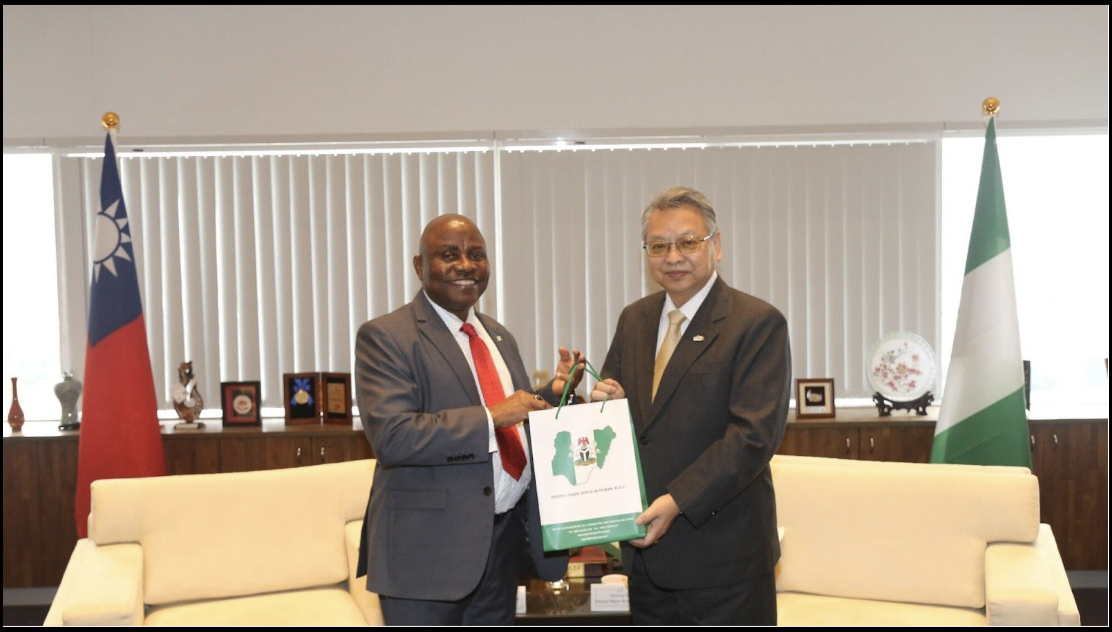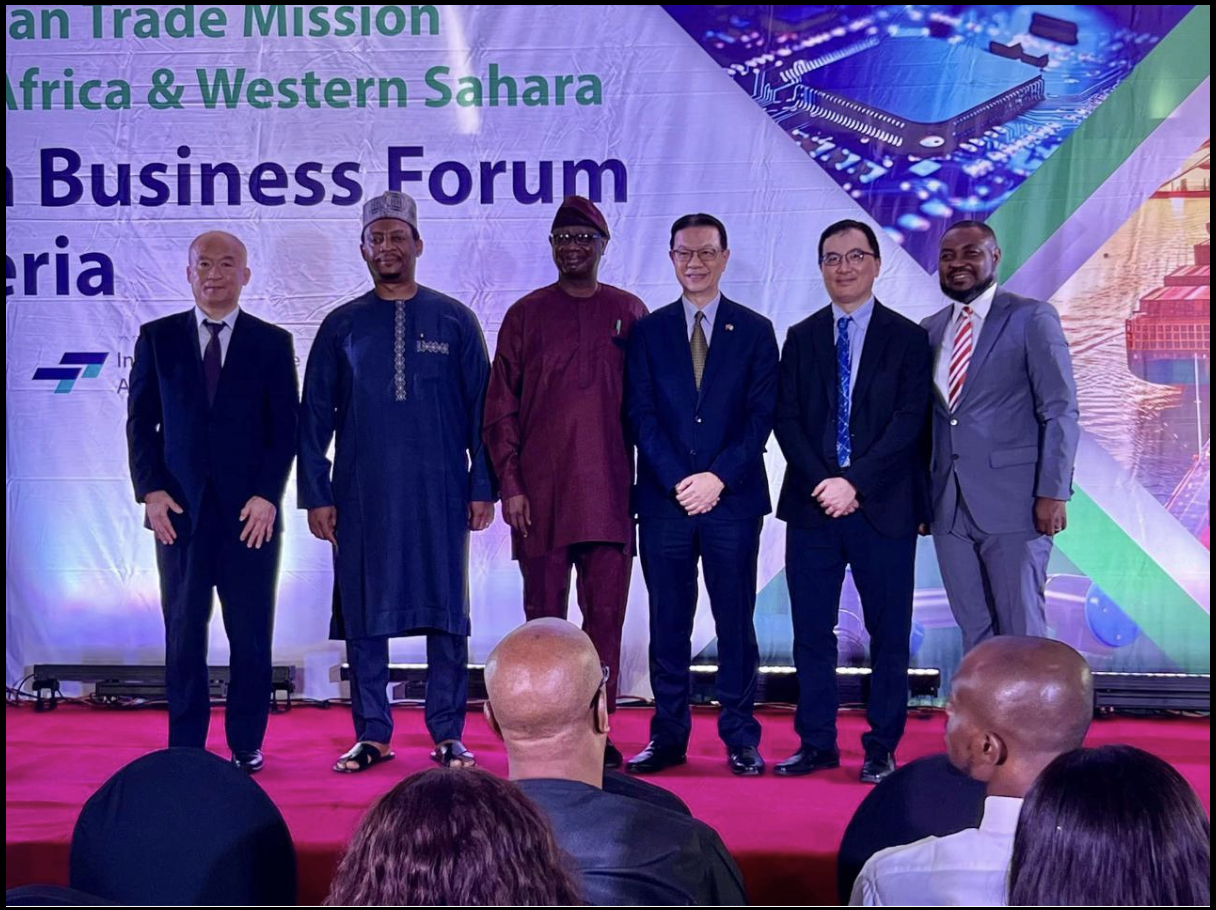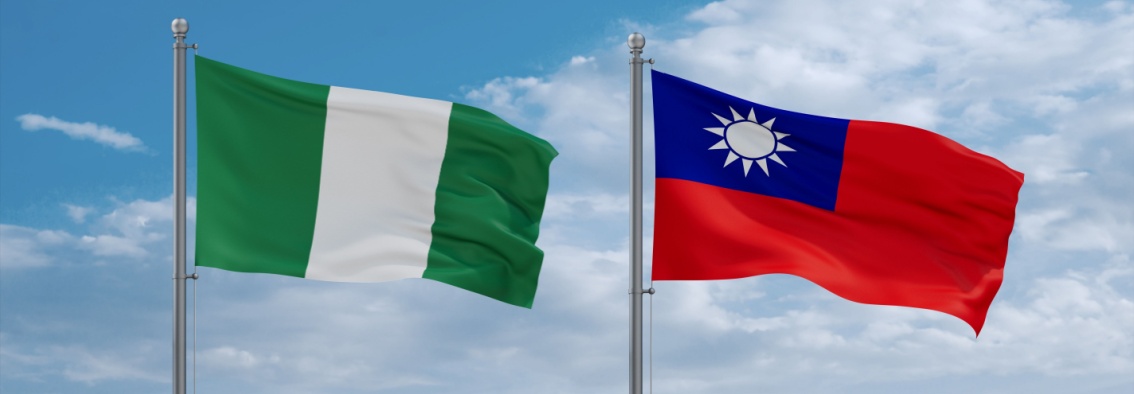In late March 2025, a delegation of Taiwanese trade experts landed in Nigeria’s commercial hub of Lagos. The arrival of high-profile dignitaries was not televised and no press conference was arranged, but it marked the second mission in five months. The visits are a telling sign of Taiwan’s intensifying effort to maintain a vital relationship with Africa’s largest economy.
These kinds of trade missions to Africa’s biggest democracy are about more than commerce. For Taiwan, they are a soft power play—or, at the very best, a calculated strategy to build influence through economic investment, technological innovation, and industrial collaboration in a country where Taipei has no embassy nor formal diplomatic ties. Nonetheless, with China’s economic footprint dominating much of Africa, and Taiwan’s increasing diplomatic isolation, the success of these delegations is critical.

Image: In 2022, Ibrahim Akopari Ahmed, former Nigerian diplomat at the Nigeria Trade Office in Taiwan, gifts Deputy Mayor of Taichung Bruce Linghu. (Image Source: Wikimedia Commons)
Taiwan’s Expanding Presence
The year 2017 was a dramatic one. The Nigerian government moved Taiwan’s trade office from its capital Abuja to Lagos. It acted, of course, under pressure from Beijing. Ever since, Taipei has been operating in a diplomatic gray zone because Nigerian leaders changed the course of relations. After Nigeria recognized the People’s Republic of China’s (PRC) interpretation of the “One-China Policy,” Taiwan has only been able to stitch together commercial and informal relationships via its Taipei Trade Office in Lagos.
In spite of this shift in ties, over 80 Taiwanese companies representing different interests have been operating across Nigeria’s economy. They are penetrating sectors where Nigeria is lacking homegrown technology: from consumer electronics and steel to ICT, agriculture tech, as well as energy services.
Joana Mai (麥嘉容), Taiwan trade attaché to Nigeria, noted that while the trade between the countries plunged to USD 300 million in 2020, it grew to USD 530 million in the first nine months of 2021. In 2022 alone, Taiwan-Nigeria trade was estimated to have reached around USD 1 billion, though it tumbled sharply again in 2023 to USD 500 million due to several factors ranging from exchange rates, limited diplomatic representation, and the lack of renewal of a trade agreement.
As trade numbers grow, Taiwan is demonstrating its capacity to build itself into Nigeria’s economic architecture using prudent commerce, as an alternative to traditional diplomacy.
Taiwan’s Trade Diplomacy
Taiwan’s high-brow business missions and industrial collaboration efforts are at the heart of this approach. The recent trade delegations, organized by the Taiwan External Trade Development Council (TAITRA), included the representatives from nine major Taiwanese tech firms, such as Delta Electronics, Pegatron, and Inventec, and others. Their goal is a long-term one: to transition from relations rooted in basic merchandise trade to joint investment in factories, smart manufacturing, and capacity building in areas aligned with President Bola Tinubu’s Renewed Hope Agenda, which emphasizes digital transformation and industrial self-reliance.
In tandem with that agenda, Taiwanese firms, partnering with Nigerian agencies like Nigerian Investment Promotion Commission (NIPC) and the National Agency for Science and Engineering Infrastructure (NASENI), have initiated technology transfer programs to establish industrial park partnerships in cities such as Ibadan in the west, Enugu in the east, and Kano in the north, similar to the one already operating in the capital, Abuja. These economic initiatives place Taiwan in a head on competition with China and allow Taiwan to set itself apart through reliability, specialized technology, and mutually-beneficial collaboration.

Image: In May 2024, nine Taiwanese companies and MAXXIS Tyre, a Taiwanese-owned Company in Nigeria, participated in the “Nigeria-Taiwan Business Forum” in Lagos with the aim of strengthening bilateral trade between Nigeria, West Africa, and Taiwan. (Image Source: Taipei Trade Office in the Federal Republic of Nigeria)
Beyond Traditional Diplomacy
Despite its growing trade presence in Nigeria, the broader geopolitical environment has become more complex for Taiwan. In part, this is because the PRC’s Belt and Road Initiative continues to attract attention and financing, while Taiwan lacks the kind of cash wielded by Beijing or Washington. This is where Taiwan’s strategy for soft power is facing its toughest test.
Since the United States and other Western donors began scaling back some operations in Africa, such as USAID programs, Taiwan finds itself walking on eggshells. Previously, these aid channels were buffers for non-diplomatic actors, but now, they are shrinking. In their absence, Taiwan must look to rely more on business diplomacy and technological collaboration to keep its influence afloat.
In an article published by the East Asia Forum on March 15, 2024, written by Minglei Wang, Jeffrey Gil, and Nicholas Godfrey, three academics from Flinders University, argued that “Taiwan needs to build soft power… to overcome disabling international challenges currently facing President Lai Ching-te (賴清德). Preventive external communications can help the government of President Lai increase global awareness, in fact, even gain sympathy and win support from the international community.”
Nonetheless, through forums, business alliances, and education exchanges, Taiwan sees opportunities for new footholds of influence, even in the face of Beijing’s growing economic advantages.
In September 2024, at the Taiwan Technology Day in Lagos, the chairman of the Taiwan External Trade Development Council, James Huang (黃志芳), emphasized the need for mutual cooperation rather than unhealthy competition. He highlighted some of Taiwan’s strengths that include green energy, technology, and manufacturing, and encouraged joint industrial investments in these realms in Nigeria. During the same period, statements made by Huang revealed Taiwan’s desire to collaborate across sectors such as ICT, petrochemicals, machinery, reflecting Taiwan’s spirit of serving as a reliable partner.
Hinting at Nigeria’s long-term ambitions to reduce its overdependence on oil exports, the chairman of the House Committee on Science and Engineering, Hon. Inuwa Garba, called for enhanced collaboration between Nigeria and Taiwan in the fields of science, engineering, and technology; while also emphasizing that such a partnership would accelerate Nigeria’s economic growth and national development.
Taiwan’s Roles in Nigerian Technology and Supply Chains
Another vital piece in Taiwan’s strategy is its strength in critical technology sectors. This strength lies in the production of semiconductors, solar panels, smart grids, and industrial automation. These are areas where Taiwanese firms are able to rival other global leaders, and where Nigeria is seeking outside cooperation and expertise to boost its moribund oil and gas refinement facilities (which has been impacted by PRC competition) and reduce its import dependency. The Taiwan Climate Partnership (TCP), an alliance of leading Taiwanese tech firms including Taiwan Semiconductor Manufacturing Company Ltd. (TSMC, 台灣積體電路製造股份有限公司), Acer, ASUS, and Delta Electronics, is working assiduously to enter sustainable supply chain cooperation agreements with African markets—in which China has typically held stronger presences.
Outside of these efforts, institutions like the Taiwan International Cooperation and Development Fund (Taiwan ICDF, 國際合作發展基金會) have supported vocational and agricultural training in several West African nations: for example, establishing an ultra-modern skills training center in Gambia, organizing multi-country rice‑production workshops, and supporting agricultural and vocational training in Burkina Faso. As of now, however, no such ICDF programs appear to be active in Nigeria, although they underscore the potential of this model. Further, research on Taiwan’s international strategy shows that the ICDF engages with foreign elites and global audiences via development assistance and NGO-led initiatives, illustrating how Taiwan projects soft power beyond its formal diplomatic partners.
Taiwan’s Competition for Influence with China
Taiwan still shoulders risk in pursuing these moves, since China is highly sensitive to any perceived encroachment by Taiwan, especially in countries where diplomatic recognition remains one-sided. Still, Nigerian officials continue to walk a precarious tight-rope, with Nigerian leaders maintaining public diplomatic and symbolic gestures toward China that align with Beijing’s expectations. At the same time, they are engaging economically and commercially with Taiwan discreetly, without public acknowledgment, to avoid political fallout with China. All the same, analysts from the region argue that Nigeria, like its African counterparts, is moving along a route of strategic diversification—one that avoids overreliance on any single partner.
Speaking at a 2023 press event, Andy Yih-Ping Liu (劉翼平), Representative of the Taiwan Mission in Nigeria, highlighted Taiwan and Nigeria’s mutual democratic values and expectations for economic cooperation. Liu also mentioned Nigeria’s ambitions to transform its South-East region into the “Taiwan of Africa,” emphasizing Taiwan’s own journey of economic development. These statements underscore Taiwan’s interest in partnership and shared growth that is less antagonistic, and more collaborative.
Strategic Bet
While Taiwan’s diplomatic charm in Nigeria is still not very pronounced, its presence is undeniable and increasingly pronounced. Taiwan has shown that official diplomatic recognition is not the only path to gain influence in a foreign country. By embedding itself into Nigeria’s economic agenda through technology, trust, and trade, Taiwan is achieving influence nonetheless.
Indeed, Taiwan’s outreach in Nigeria presents an important question: can a diplomatically-isolated island build meaningful, enduring ties in Africa through soft power alone? If the Nigerian model succeeds, it could serve as a blueprint for Taiwan’s diplomacy across other nations on the continent. For now, one thing is clear: Taiwan is no longer just trying to survive geopolitically—it has begun to see the need to shape the game.
The main point: In spite of a lack of official ties, Taiwan is entirely retooling its diplomatic relations with Nigeria via strategic economic investments. Operating through its Taipei Trade Office in Lagos, Taiwan relies on commerce, technology, and vocational training to build influence in Africa’s largest economy. Given that its partnerships with Nigeria fit well with President Tinubu’s development agenda, Taiwanese firms are able to explore virgin opportunities. Fettered by China’s economic dominance and diplomatic pressure, Taiwan pursues business diplomacy as an alternative to traditional engagement, simultaneously testing whether economic ties without governmental recognition can bring about lasting international partnerships.




